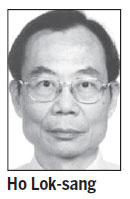Moving forward with MTR fare reviews
Updated: 2012-10-16 06:47
By Ho Lok-Sang(HK Edition)
|
|||||||||

There are indeed good reasons to amend the formula for Mass Transit Railway (MTR) fare adjustments. At present, the formula is half based on the Consumer Price Index (CPI) inflation rate and half on the change in the Nominal Wage Index in the transportation sector, and subtracting a predetermined productivity gain.
The architects of the present formula presumably think that the CPI inflation rate and the wage hike reflect the cost pressures faced by the MTR Corporation (MTRC), and probably also, to a certain extent, how ready people are for fare rises. If fares go up at more or less the same rate as inflation, people could accept that such increases are only nominal and not real. The productivity gain is taken to allow the company to achieve better profit, thus giving it some leeway to minimize any surge in fares.
However, people are objecting that a rise in the CPI may not affect the company's cost at all, but it may put pressure on the Hong Kong public. A fare increase should not be justified by a rise in the cost of vegetables or pork, or a rise in rent. Neither food cost nor housing cost has any direct bearing on the MTRC's bottom line, though both have a great bearing on the public's bottom line - their disposable income after food and housing. Inflation could actually reflect the hardship faced by the Hong Kong public.
People also object to fare increases because they say the corporation had achieved a net profit for the 12 months ended Dec 31, 2011 that was higher than expected. At HK$14.72 billion, the profit was up by 22 percent from the previous year. In general, denying a company the right to raise fares on account of its impressive financial performance is not necessarily in the long-term public interest. If the company is profitable, we need to ask why. If the increase in profitability is a windfall due to factors beyond the company's, I agree there is a case for the public to share part of the windfall - in part for the reason that the community may well have contributed to the windfall.
If the increase in profitability is the result of good management, innovation and expansion of the market beyond Hong Kong's, it does make sense for the company to retain the bulk of the profit increases, so as to preserve the motivation to innovate and improve efficiency. I would argue that only when it can be shown that the MTRC is enjoying windfalls should we require the corporation to share its profits with the public.
I would argue that the MTRC be allowed to raise fares upon demonstration of cost pressures. Measures of cost pressures include wage rise in the transportation sector, energy costs, and costs charged by the company's suppliers. I would propose that the rate of fare increases should not be higher than the rate of increase of nominal wages.
I agree with the suggestion that the MTRC should be subject to a penalty in the form of lower fare increases when it fails to achieve stipulated performance targets. The company should be rewarded for good performance and penalized for bad performance at the same time.
There was a suggestion for the government to plow back the dividends it receives each year to offset some of the fare increases, so as to ease the pressures on the public. This assumes that subsidizing MTR travel is more beneficial than other items of public spending. Such assumptions need to be tested rather than taken for granted. Actually, I continue to think that the HKSAR government really should take as one of its top priorities the building of more homes for the disabled, the infirm and the aged.
Moreover, if there is a case to subsidize MTR fares, I would argue there is an even stronger case for subsidizing long-distance travel. In general, those living far away from the city tend to be poor people. Effectively lowering the cost of travel will reduce segregation and allow people living in the city's periphery to come to the city center to work. This is very important given that job opportunities on the city's outskirts are scarce.
If the cost of travel is effectively reduced, the willingness of people to live in the city's periphery will be much higher. Public housing development on the outskirts of the city will then be more palatable. The demand from the public for more public housing in the city will be reduced.
The author is director of the Centre for Public Policy Studies, Lingnan University.
(HK Edition 10/16/2012 page3)